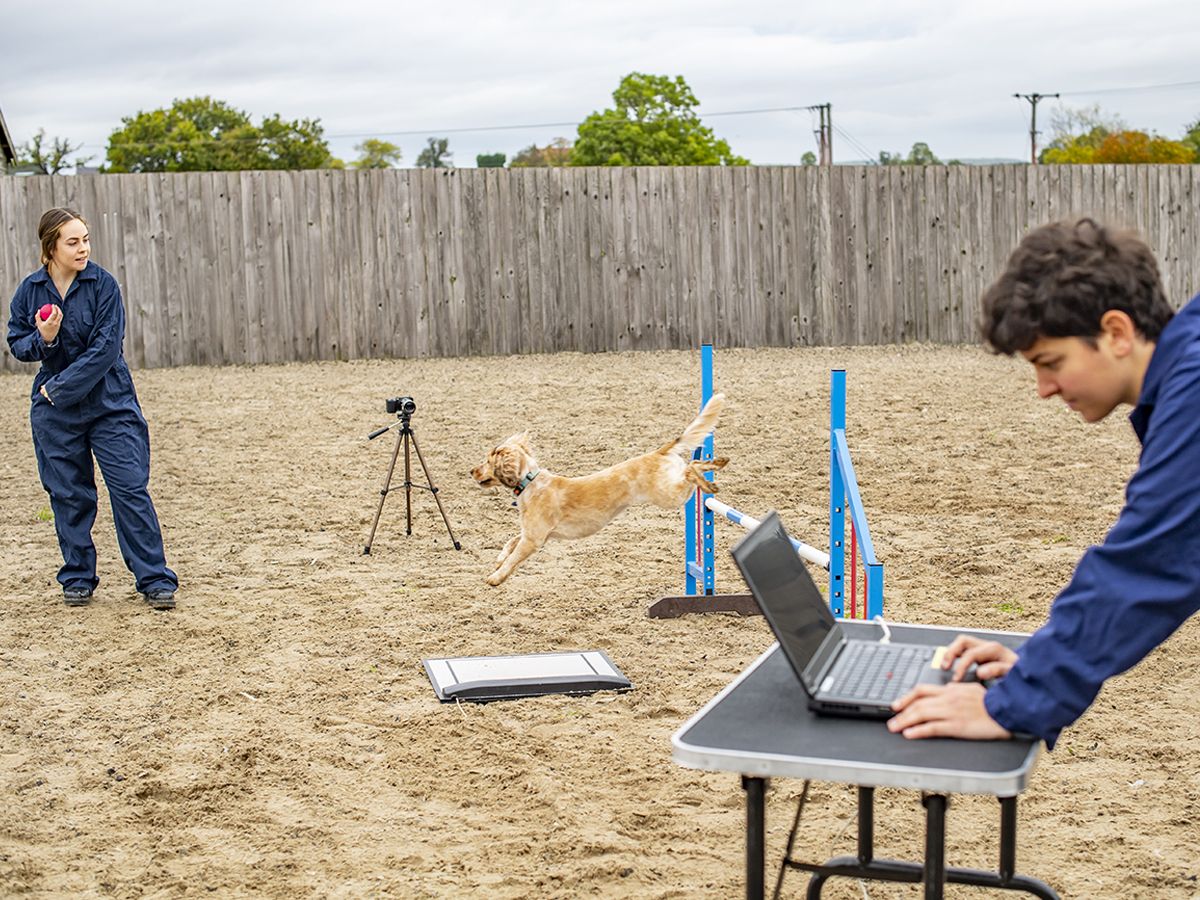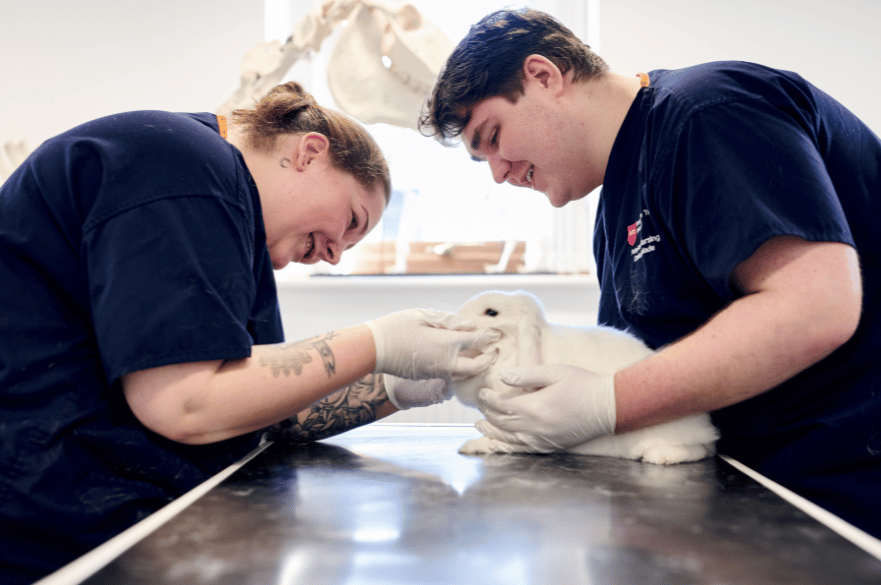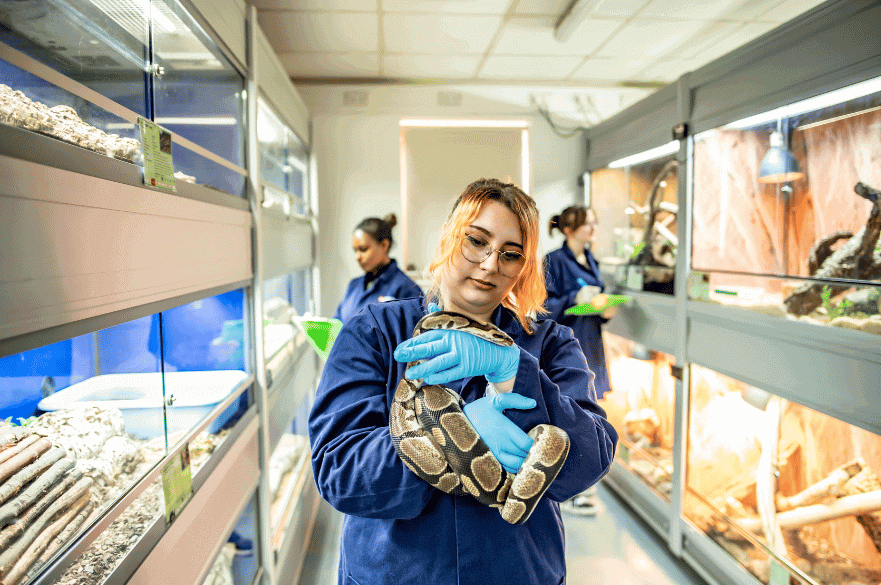About this course
What does it mean to be a veterinary nurse? Why are some people drawn to a career caring for animals? For many, becoming a veterinary nurse isn't just a career choice – it's a calling. Some individuals are born to nurture, support, and advocate for those who cannot speak for themselves. With over half of the UK adult population owning a pet (PDSA Animal Welfare Report 2024), and the ever-growing demand for UK-qualified veterinary nurses in developing countries, the demand for compassionate, high-quality animal healthcare has never been greater.
If you’re a FdSc Veterinary Nursing graduate or an experienced veterinary nurse, this course will provide you the opportunity to develop your academic qualification to the level of an honours degree. It’s designed to build on your existing skills and knowledge and take your training to the next level.
You'll explore advanced clinical procedures, evidence-based practice, and the broader contributions veterinary nurses make in companion animal care, equipping you with the expertise and confidence to thrive and enhance your career.
What you’ll study
Studying this subject at a higher level is a great way to grow your skills and confidence. It will help you to think more deeply, take on more responsibility, and become a leader in your field. This top-up degree will help you learn more about the science behind animal care, get involved in research, and crucially help you to stand out. It will provide you with the tools to make a real difference, bring new ideas to the job, and play an important role in the future of animal health and welfare.
The highlights of our BSc (Hons) Veterinary Nursing Top-Up Degree include:
- Learning in our Royal College of Veterinary Surgeons (RCVS) accredited Veterinary Nursing Centre – a purpose-built simulated veterinary practice, giving your studies a real-life feel
- Gaining insights and inspiration from our lecturers who are all Royal College of Veterinary Surgeons (RCVS) registered and have a combined 150 years’ experience in the industry
- Preparing you to become proficient with responsibilities such as critical care nursing, leadership, global disease concepts and exotic species nursing
- Developing your confidence and skills to work in patient advocacy, surgical assistance, and chronic disease management – all areas demanded by a modern vet practice.
Applied Critical Care Nursing (20 credits)
You’ll study the different components of critical care nursing and effective approaches to triage of the emergency patient. You’ll evaluate treatment regimens and care planning, as well as investigate the emergency techniques involved with supporting patients and the concept of cardio-pulmonary resuscitation and advanced life support. You'll also look at anaesthetic monitoring, pain management, and gain the confidence to tackle challenging anaesthetic patients.
Exotic, Wildlife and Large Animal Nursing (20 credits)
Explore the care and management of exotic, equine, livestock, and UK wildlife species. You will study husbandry, anatomy, common medical conditions, surgery, nursing care, legislation, and rehabilitation techniques, building on your prior knowledge to deliver informed veterinary care to a wider range of animals.
Global Animal Disease (20 credits)
Raise your awareness of global veterinary medicine and the different practice environments, and develop your critical thinking and analytical approach to animal disease.
Advanced Practice in Veterinary Nursing (20 credits)
Focus on problem-solving skills and the use of research to approach complex cases. You’ll develop evidence-based and holistic care techniques. You will also gain the knowledge and skills needed to undertake a clinical supervisor role.
Evidence-Based Veterinary Nursing Project (equivalent to a dissertation) (40 credits)
You will undertake a significant research project examining the relationship between theoretical and practical clinical management using evidence-based veterinary medicine. There is the option to combine this module with working aboard, giving you an insight into diseases and working practices in an international context. In addition, if you are acting in a clinical supervising role, you will be able to use this reflective report as evidence to apply for AFHEA recognition.
We regularly review and update our course content based on student and employer feedback, ensuring that all of our courses remain current and relevant. This may result in changes to module content or module availability in future years.
Don’t just take our word for it, hear from our students themselves
Video Gallery
How you're taught
This course uses blended learning, so you get the best of both worlds – flexible online study plus some in-person or live sessions.
Most of its content is available on demand, so you can study whenever it suits you. You’ll find videos made by your tutors, quizzes to check your understanding, discussion forums, problem-solving tasks, and opportunities to review each other’s work. This mode of programme also enables you to gain valuable clinical skills and insights from a freshly graduated FdSc registered veterinary nurse.
Quarterly contact days will involve you visiting our campus to take part in practical sessions. Here, you’ll apply the knowledge gained from your online lectures and demonstrate your new skills. Our lecturers live and breathe veterinary nursing science and will be there to support you and answer queries, whether that’s in person or online.
You’ll gain hands-on veterinary nursing experience using clinical models, multiparameter monitoring devices, radiography mock-up facilities, surgical equipment, and anaesthetic devices. We also have highly specialised equipment, including an ultrasound machine, endoscopy, and various anatomical specimens and models.
Since the course is partly online, having a reliable internet connection is important.
How you're assessed
Part-time:
- Year 1 - Presentation, Practical and Written Report
- Year 2 - Dissertation, Written Report
Full-time:
- Year 1 - Presentation, Practical, Written Report and Dissertation
Contact hours
Part-time students will be around five hours per week 'contact time', which is made up of a mixture of directed learning content and directed learning activities.
Full-time students will be around ten hours per week 'contact time', which is made up of a mixture of directed learning content and directed learning activities.
Approximately 20-25% of the course consists of directed content, including practical activities, tutor-generated video materials, lectures, and workshops.
75-80% of the course is guided independent learning, either: wider reading, study skills support, or external resources.
These percentages would also fit with a week-by-week basis.
Careers and employability
Once you qualify from this course, a wide range of career opportunities will open up for you. Most of our graduates go on to work as full-time veterinary nurses in settings such as clinical veterinary practices, animal hospitals, or referral centres. Alternatively, you could apply your new skills and knowledge in related areas like education and teaching, or laboratory work.
Our graduates have gone on to:
- Work as clinical Registered Veterinary Nurses (RVNs) in busy first opinion and referral veterinary hospitals
- Take on roles as clinical supervisors, supporting and mentoring veterinary nursing students through their training
- Travel internationally to participate in wildlife support projects
- Become OSCE examiners for veterinary nursing practical exams
- Work in a variety of settings, from corporate hospitals to independent practices.
- Gain an AFHEA certificate.
If you’d like to know more about the support you’ll receive both during and after your course, visit our Employability pages.
Campus and facilities
You’ll study in our purpose-built veterinary nursing centre, animal unit and Brackenhurst teaching rooms, with standout facilities including radiography, ultrasound and endoscopy equipment, as well as anatomical specimens and models.
As a dedicated home for our animal, rural and environmental science courses, the Brackenhurst Campus has a character all of its own. From students and staff to the animals themselves – cats and cattle, sheep and horses – it’s all about community. Relax with a coffee in the Orangery; kick back with your course mates in the Brack Bar; enjoy the peace and quiet of our Victorian walled garden or Eco-Library; grab a pal and take a relaxing stroll through 500 hectares of stunning countryside.
Our Brackenhurst Campus sits on the doorstep of Southwell, a picture-perfect market town filled with rustic pubs, cosy cafés, and boutique shops. A little further afield, and served by reliable, late-running buses, you’ve got Nottingham – a legendary student city stuffed with history, culture, and well-kept secrets to discover at your leisure.
Entry requirements
UK students
You need to be a registered veterinary nurse (registered with the RCVS prior to enrolment); and
- have completed the FdSc Veterinary Nursing degree; or
- have completed a 240-credit foundation degree; or
- have completed a Level Five or equivalent qualification.
You will also be required to attend an interview.
To find out what qualifications have tariff points, please use our tariff calculator.
Additional requirements for UK students
There are no additional requirements for this course.
Contextual offers
If you don’t quite meet our entry requirements, we might be able to make you a lower offer based on a range of factors, including your background (such as where you live and the school or college you attended), your experiences and your individual circumstances (you may have been in care, for example). This is called a contextual offer, and we get data from UCAS to help make these decisions. We do this because we believe everyone with the potential to succeed at NTU should have the opportunity to do so, no matter what barriers you may face.
Other qualifications and experience
NTU welcomes applications from students with non-standard qualifications and learning backgrounds, either for year one entry or for advanced standing beyond the start of a course into year 2 or beyond.
We consider study and/or credit achieved from a similar course at another institution (otherwise known as credit transfer), vocational and professional qualifications, and broader work or life experience.
Our Recognition of Prior Learning and Credit Transfer Policy outlines the process and options available for this route. If you wish to apply via Recognition of Prior Learning, please contact the central Admissions and Enquiries Team who will be able to support you through the process.
Getting in touch
If you need more help or information, get in touch through our enquiry form.
International students
You need to be a registered veterinary nurse (registered with the RCVS prior to enrolment); and
- have completed the FdSc Veterinary Nursing degree; or
- have completed a 240-credit foundation degree; or
- have completed a Level Five or equivalent qualification.
You will also be required to attend an interview.
We accept equivalent qualifications from all over the world. Please check your international entry requirements by country.
English language requirements: See our English language requirements page for requirements for your subject and information on alternative tests and Pre-sessional English.
Additional requirements for international students
There are no additional requirements for this course.
English language requirements
View our English language requirements for all courses, including alternative English language tests and country qualifications accepted by the University.
If you need help achieving the language requirements, we offer a Pre-Sessional English for Academic Purposes course on our City campus which is an intensive preparation course for academic study at NTU.
Other qualifications and experience
If you have the right level of qualifications, you may be able to start your Bachelors degree at NTU in year 2 or year 3. This is called ‘advanced standing’ entry and is decided on a case-by case basis after our assessment of your qualifications and experience.
You can view our Recognition of Prior Learning and Credit Transfer Policy which outlines the process and options available, such as recognising experiential learning and credit transfer.
Sign up for emails
Sign up to receive regular emails from the International Office. You'll hear about our news, scholarships and any upcoming events in your country with our expert regional teams.
Getting in touch
If you need advice about studying at NTU as an international student or how to apply, our international webpages are a great place to start. If you have any questions about your study options, your international qualifications, experience, grades or other results, please get in touch through our enquiry form. Our international teams are highly experienced in answering queries from students all over the world.
Policies
We strive to make our admissions procedures as fair and clear as possible. To find out more about how we make offers, visit our admissions policies page.










